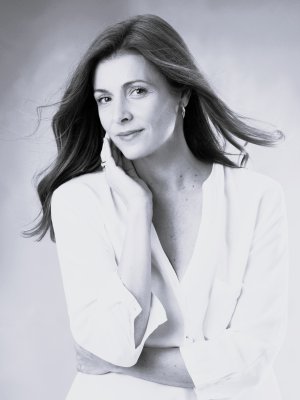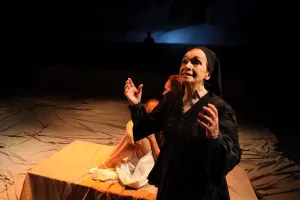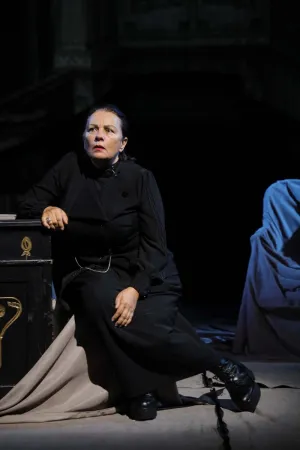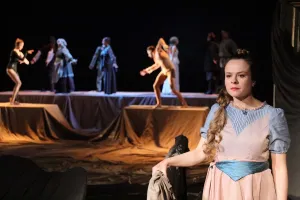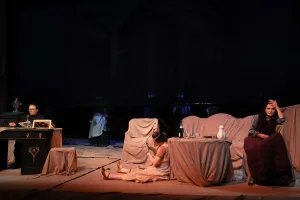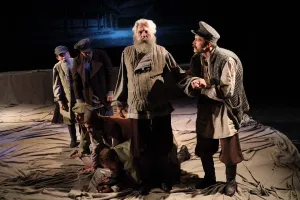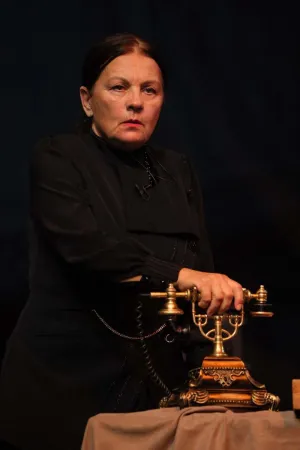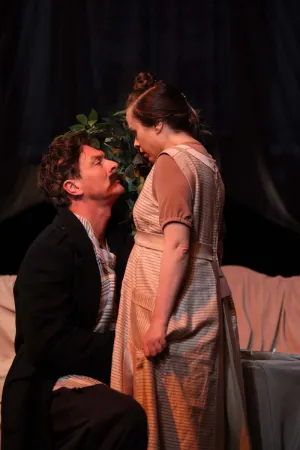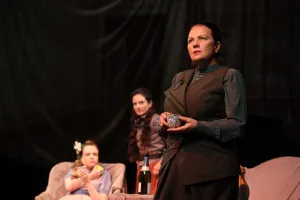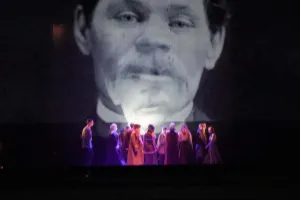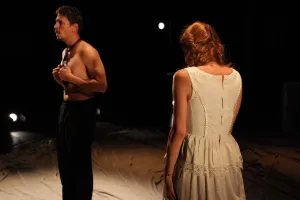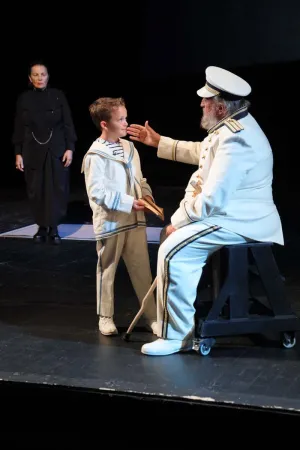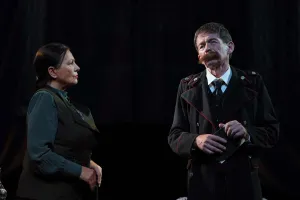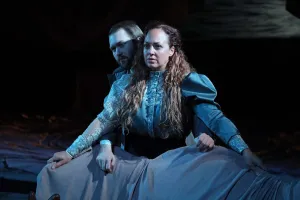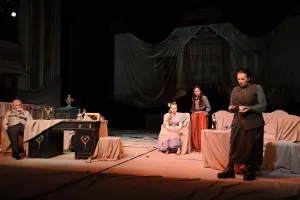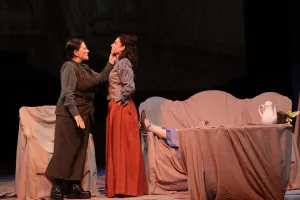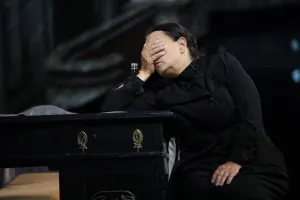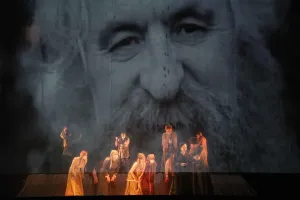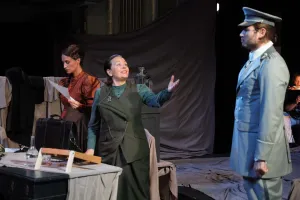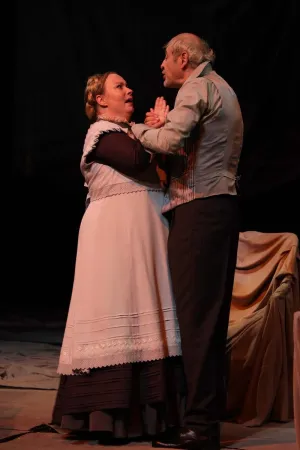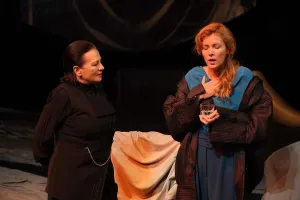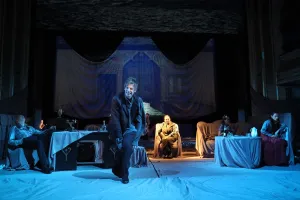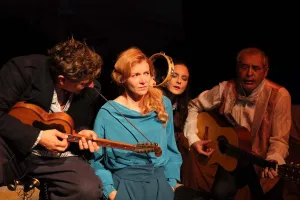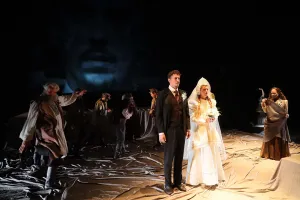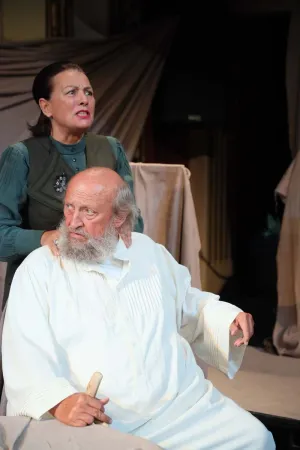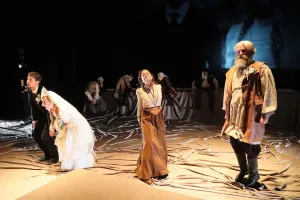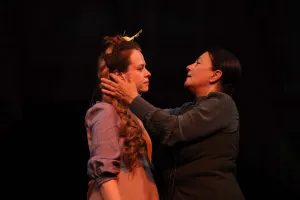Vassa Zheleznova and others
drama by Maxim Gorky
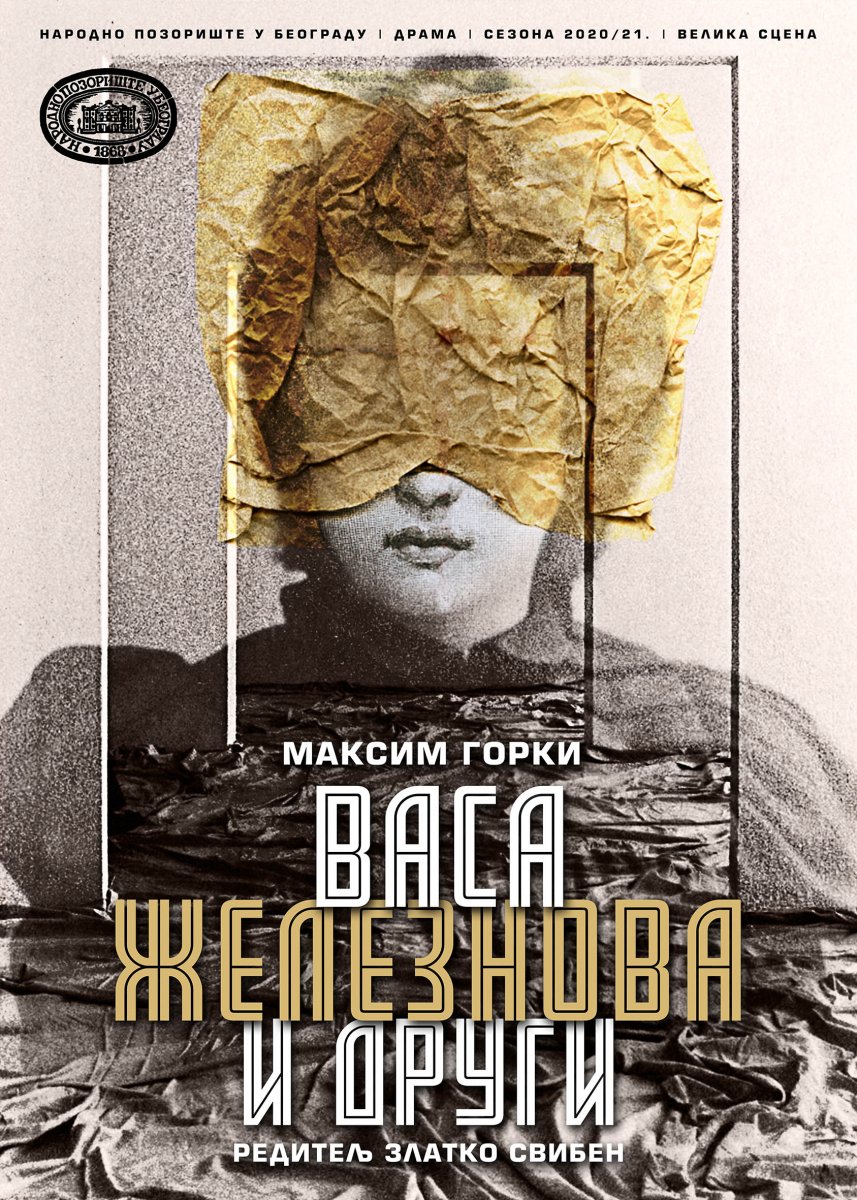
MAXIM GORKY (Alexei Maksimovich Peshkov, 1868-1936), Russian Soviet prose writer and playwright. He entered literature as the bearer of rebellious romantic tendencies, symbolized as the “storm bearer” (Poem about the storm bearer) and based on legendary fables about free people (Makar Chudra, Old Izergil), but also on contemporary material about apostasy from the conventional morality of the petty bourgeoisie (Chelkash, Konovalov, Malva). In the works under the influence of the Russian tradition and Nietzsche, he discussed the conflict between the principles of action and the passive-contemplative attitude towards life (The Song of the Falcon), the dilemma between “low truth” and “comforting lies”. At the same time, he depicted the real crisis of society and the process of decay of strong individuals in the capitalist reality (The Orlovs, Foma Gordeyev, Three of Them ...), which in the drama The Lower Depths, led to a break with beggars illusions. In the later period, he devoted himself mainly to two topics - the search for a new faith within the God-building concept (the character of Luke in The Lower depths, Confession), which resonated in the educational novel about the maturing revolutionaries (Mother), and examining the petty-bourgeois reality of Russia at the start of the century, and its social psychology and the spiritless essence of her ambitions (Okurov City, The Life of Matvei Kozhemyakin). Since 1913, he has been approaching the topic of the conflict between a restless and irreconcilable individual and an inert environment creating autobiographical material (My Childhood, In the World, My Universities). After 1917, he argued with Lenin and the Bolshevik leaders, criticizing the attitude of the Soviet government towards the intelligentsia, the struggle for political domination and the manifestations of the peasant masses during the years of the civil war. He actively participates in the spiritual renewal of the country, which presented him as the most important cultural ambassador in the entire post-October era. At the same time, he completed his research on the phenomena of Russians and Russia, returning to the active, creative principle of the conflict between heroes and the environment and condemning the new version of “man from the underworld” as a result of bad social circumstances, even in revolutionary reality(Sketches and Stories, three volumes). This philosophy of unconditional glorification of a man with principle and reputation of a passive attitude towards circumstances is most fully expressed in Artamonov Bussiness, and it also dominates the idea of the tetralogy - Life of Klim Samgin. In his plays, he complemented the conflicts in the trade, developing the motive of choosing a life path and “escape” from the stagnant conservative reality into the world of freedom with a supreme example in the fate of “late rebel” Bulichov (Jegor Bulichov and others). Gorky was the most prominent spiritual developer; in the domain of aesthetic pursuits, he declared himself to have a realistic view, , arguing with decadent orientations, Tolstoy’s social pedagogy and the philosophy of “suffering” in Dostoevsky’s legacy; he is a follower of Korolenko and Chekhov, responsible for the renewal of legends and fairy tales with modern materials and symbolism, for the development of the narrator’s function in epic narration, for the improvement of a “negative hero”, for continuing Shakespeare’s dramatic conflicts within “historical” scenes. Most famous for: The Philistines, The Lower Depths, Summerfolk, Children of the Sun, Barbarians, Enemies, Vassa Zheleznova, Yegor Bulychov and Others.
About the text:
While we were creating the performance we were searching for a family that was lost. We were dreaming of it. The moment we woke up Vasa Železnova abandoned us.
Slavenka Milovanović
About the writer:
When Alexei was twelve, his grandfather, whom he lived with, threw him out of their home saying: YOU ARE NOT A MEDAL TO HANG AROUND MY NECK, GO TO THE STREETS AMONG THE PEOPLE TO GROW UP. In the streets among the homeless, artists and people’s leaders he was looking for the TRUTH, because of which he died. And that is how he became Maxim Gorky.
Slavenka Milovanović
ILYA VASILEVICH ARTAMONOV
A handsome man with a curly beard, strong stature and even stronger will. Zodiac sign - Leo. His wife died young and he was left alone with his two sons, and then he adopted a third, his nephew. After he was freed of his serfdom, prince George, whose property he was in charge of, rewarded him richly and Ilya moved to the town of Dryomov with his three sons. There he founded a family business, which, thanks to his business acumen and the joy in which he constantly worked, progressed quickly and brought him a good income. He married his eldest son to the daughter of a prominent city elder and had a granddaughter, Vassa. He died as he lived. Quickly, abruptly, suddenly.
PYOTR ILYICH ARTAMONOV
Ilya’s eldest son, Vassa’s father. Calm, silent, even too serious as a young man, and later, you could say, an almost boring man. However, prone to rare aggressive outbursts. Zodiac sign - Virgo. It seemed to his father that there was not enough zeal in him, and to his wife Natalia that there was not enough love in him for her. He was usually too worried about work and children.
NIKITA ILYICH ARTAMONOV
Ilya’s younger son, born with a hump on his back. Never evil or cunning, but usually gentle, modest and good. An attempt to hang himself because of his strong love for his brother’s wife took him to a monastery. There, the pilgrims respected him, and he himself did not believe in his sermons and believed that the abbot invented them. He fatefully left the family and returned to it peacefully before his death.
ALEXEI ILYICH ARTAMONOV
The son of Ilya’s sister who she gave birth to in sin with one of the princes they served. The bride died, and Ilya adopted and embraced his nephew as his own. The nobility of Alexei’s face, his nature, as well as his propensity for vices, showed his aristocratic origin. Zodiac sign - Aries. As soon as they arrived in Dryomov, he fell in love with Olga Orlova, and she fell in love with him. Few years later they got married and lived happily and joyfully for about thirty years. They had a son, an only child.
YEVSEY MITRICH BAYMAKOV
City elder. A wise and calm man, with a good heart and poor health, which suddenly worsened after the arrival of the Artamons in Dryomov. At the first meeting with Ilya, he thought: “This man came to take my place on earth.” and he surrendered to fate. After five days, Baymakov fell into bed, and after twelve he died. The whole city buried him with honors, with the presence of the priests of all five churches. However, his death cast a shadow over the Artamons in the eyes of the citizens.
ULYANA IVANOVNA BAYMAKOVA
Even in adulthood, beautiful and buxom women. Zodiac sign - Taurus. Her life passed without any excitement until the Artamons came to Dryomov. Ilya’s appearance immediately attracted, excited and frightened her at the same time. Anxious, she immediately went for advice to the fortune teller Barskaya, who told her: “Hold on to that man, he brings good fortune.” Ulyana remembered that. After Baymakov’s sudden death, it didn’t take her long to get closer to Ilya and discover the true passion, which she had been denied until then. She died of old age surrounded by grandchildren.
NATALIA YEVSEYEVNA BAYMAKOVA
Beauty of slender stature, light hair and almond-shaped eyes. As the only child of a city elder, she obediently went for a young man chosen by her father. She liked Pyotr’s brother Alexei more than her husband, and the hunchbacked Nikita sincerely fell in love with her. It is not vaguely said: “When you don’t love, there is trouble, when you love, it’s even worse.” Her marriage to Pyotr was difficult and unhappy, with the passing years they became more and more distant from each other and put the blame on each other constantly. From a young beauty, Natalia turned into a caustic, fat woman, a stranger to herself, her husband and her children.
BARSKAYA
The famous fortune teller of the town of Dryomov, without whose advice many inhabitants did not make important life decisions. Always present at every wedding and funeral in the city.
MASHKA STUPA
A janitor and a city fool. No one has ever seen him sober. He walked with a funny, limping step, emphasizing his drunken belly.
TIHON VYALOV
Housekeeper of the Artamonov’s. He takes care of everyone and everything.
ANTUSHKA
Foolish girl.
VASSA BORISOVNA
Mother. Zodiac sign - cancer. At work - the granddaughter of her grandfather Ilya Artamonov. Facing conflicts and problems in the family and the company, she also faces the question of the meaning of life not only her own, but also the lives of her ancestors and descendants. Her nature is not at all contemplative, but oriented towards action and immediate execution of the planned. Suffering, enduring efforts and torments on a daily basis for the benefit of her children, is built into the structure of Vassa’s dominant and possessive personality. In her fantasy, those children should be like her, to continue on her path. The realization that they are nothing alike is such a great temptation for Vassa that it leads to a retrograde re-examination of all the postulates of her existence which results in her death.
SERGEY PETROVICH ZHELEZNOV
In his youth, a naval captain. Zodiac sign - a taurus with a scorpio ascendant. When he stopped sailing, he took over the management of the family’s shipping company. He very quickly leaves the management of the company and gives the keys to the cash register to his wife Vassa and turns to a debauched life. Alcohol, playing cards, gambling and lust are his daily routine. He pleases his animal nature to the very end, to death.
PROHOR BORISOVICH HARAPOV
Vassa’s brother is an extroverted and somewhat narcissistic man. His zodiac sign - hedonist. His hobby is collecting old padlocks, and his favorite music is operetta. From a young age he is a favorite of women, but prone to those of the lower class. When he feels threatened, sometimes his repressed aggression erupts.
NATALIA
The eldest daughter of Vassa and Sergey Petrovich. She lives in her parents’ house in a constant silent conflict with her mother, whom she defies by getting drunk. She avoids facing real life by spending her days with uncle Prohor with wine and music. Zodiac sign - a scorpio with a capricorn ascendant. She doesn’t have an ideal, but sometimes she fantasizes about moving to America. She renounces life without even starting to live it.
LUDMILA
Younger daughter of Vassa and Sergey Petrovich. She lives in her parents’ house, and often escapes to her world of dreams and premonitions. Her favorite book is Dream interpretation. An event from her childhood, that includes her father, marked her. She is insecure when Vassa is not at home. She plays a girl who loves her mother and who would like to be like her mother. She wants to be in love and plays the passion of falling in love. She wants to feel alive, but she just mimics that feeling.
RASHEL
Daughter-in-law of Vassa and Sergei Petrovich, married to their son Fyodor. An educated and intelligent young woman of Jewish descent. She joined socialist circles early on. Zodiac sign - Leo. Her favorite writers are Nietzsche and Marx. The only thing she dreams about is a great social revolution of the whole world.
ANA ONOSHENKOVA
Vassa’s secretary. Skillfully pretending that she is caring and loyal, that she is a member of the family, she manipulates others whenever she is given the opportunity to do so.
LIZA
Zheleznov family’s made. From an early age she reads love and adventure novels. She was not particularly surprised when Prohor Borisovich entered her room one night, because the rumors about his inclination towards maids were well known - she was more surprised by her own passionate indulgence. Zodiac sign - aries. Naivety is expensive.
MELNIKOV
Member of the district court whose life dream is to be the owner of a shipping company.
PYATORKIN
Former soldier, now boatman. He courts women charmingly and is a great singer and instrumentalist.
VASSA PETROVNA
Same as Vassa Borisovna.
ANA ZAHAROVNA
Vassa’s eldest daughter, who got married and left her parents’ home at the age of seventeen, which has the consequence that every time she comes to her parents’ house again, as soon as she crosses the threshold, she regresses to the earliest stage of her convulsive struggle for her mother’s love.
PAVEL
Vassa’s youngest son, the genetic heir of the hump on Nikita Artamonov’s back. Emotionally unstable, it is easy for him to give in to despair or anger, as well as any other sudden change of mood, which is all a consequence of growing up with a mother like Vassa.
LUDMILA
Pavel’s wife. She grew up without a mother, with an insufficiently authoritative father, and a very unstable character. She searches eternally for a stable exemplary figure, which she finds only in Vassa.
MIHAILO VASILYEV
Long-term manager of the estate near Vassa. He is too lenient towards his daughter, he fails to set boundaries, and thus retaliates to the maximum for himself and her.
PROHOR ZHELEZNOV
Extremely choleric temperament.
LIPA
Maid. She finds it hard to resist pressure and tends to do whatever anyone asks of her.
KOLYA
Son of Fyodor and Rachel. He loved his mother and grandfather Sergey the most. His favorite story was “Alibaba and forty robbers”.
Here he speaks to his grandfather in the role of little Thomas and his father from the novel “Thomas Gordeyev”.
ZLATKO SVIBEN
Director and theater pedagogue, graduated in comparative literature and philosophy at the Faculty of Philosophy, University of Zagreb and theater directing, in the class of Professor Dimitrije Đurković, at the Faculty of Dramatic Arts, University of Arts in Belgrade. At the same faculty in Belgrade, he also attends postgraduate studies at the Department of Dramaturgy. He has directed plays in many city and national theaters (Skoplje, Bitola, Niš, Leskovac, Užice, Belgrade, Vršac, Novi Sad, Subotica, Zenica, Tuzla, Sarajevo, Dubrovnik, Split, Zadar, Rijeka, Osijek, Zagreb). On several occasions he performed the duty of the director of Croatian drama, artistic director and permanent director in Rijeka HNK. He is also active in theater pedagogy (Novi Sad, Tuzla, Zagreb), especially when in the program sense he initiated and formed the Department of Acting and Puppetry at the time of the founding of the new Art Academy of the JJ Strossmayer University in Osijek. He is the winner of many professional awards. We highlight the Firebird Award; with five nominations, on three occasions, in the Croatian theater certainly the most prestigious - the Croatian Acting Award (2002 for directing the play “Tonight we improvise” (HNK, Zagreb), and in 2005 and 2012 for the Osijek play “Sirano de Beržerak” and “Unterstadt” (HNK, Osijek)); the Republican Vladimir Nazor Award (2012) and the Dubrovnik Orlando Award (2013). In Serbia, Zlatko Sviben is the winner of the Joakim Vujić Award for directing (1985) and the Ardalion Award, which was won in 2013 by the play “Crime and Punishment” (Gavela Theater, Zagreb) as a whole, and a directing award. He participated in Sterija’s Pozorje from 1984 to 1987 with four plays, and from 2013 to 2016 with three more plays.
The absence of his directing work in Serbian theaters has lasted for decades, and the list of plays, as well as what he directed from Serbian dramatic literature, is:
“Summer on the Sunny Terrace”, Mladen Popović, (RZUPR “Pod razno” and SKC Belgrade), 1980.
“Always green”, Aleksandar Popović, (National Theater, Niš), 1980.
“Fourth Wall”, Slavenka Milovanović, (Open Theater of the House of Culture “Student City”, New Belgrade), 1980.
“Visit of a sea aunt, ie. tragedy of genius “, Branko Dimitrijević, (HNK Ivan pl. Zajc in Rijeka, Croatian drama), 1981.
“House of Horror “, Franz Xaver Kroetz, (SNP and Merry Theater” Ben Akiba “, Novi Sad) 1981.
,,Captain John Peoplefox “, Dušan Radović and Miroslav Belović, (SNP in Novi Sad) 1982.
“Some time in Salzburg “, based on the novel by Jovan Ćirilov (National Theater in Zenica), 1982.
“Damascene Saber”, Aleksandar Popović, (Belgrade Drama Theater), 1983.
“As you like it or as you want it” (“How you like it” / “Epiphany Night”), William Shakespeare, (National Theater, Subotica), 1983.
“An event in the town of Goga”, Slavko Grum, (Belgrade Drama theater), 1984.
“Endgame”, Samuel Beckett, (Theater “Godo-fest”, Belgrade) 1984.
“Unholy at the Faculty of Philosophy”, Ivo Brešan, (National Theater, Leskovac) 1985.
,,Magna Carta”, Mario Rossi (National Theater, Bitola), 1986.
“Macbeth”, William Shakespeare, (National Theater Subotica, Shakespeare Fest, Palić) 1986.
“Claustrophobic Comedy “, Dušan Kovačević, (Marin Držić Theater, Dubrovnik) 1988.
“A Respectable Wedding”, Bertold Brecht, (Evening stage of the theater “Duško Radović”, Belgrade), 1989.
“Damascene Saber”, Aleksandar Popović, (Evening stage of the theater “Duško Radović”, Belgrade), 1990.
“Alkestida”, Euripides, (National Theater Subotica, Festival - Balkan Tragedies, Kelebija), 1990.
“Lame Ideals”, dramatization by Olga Dimitrijević of Milutin Uskoković’s novel “Čedomir Ilić” (National Theatre Užice) 2016.

